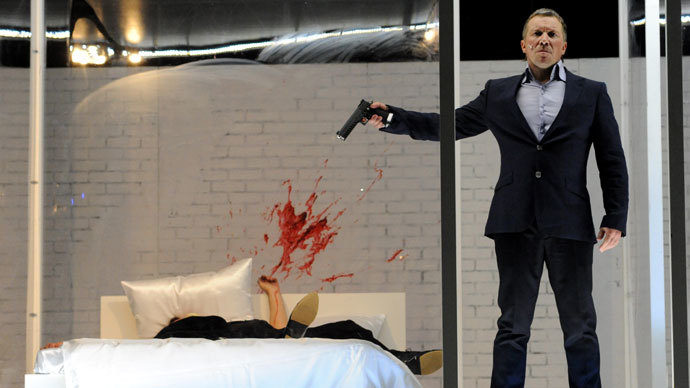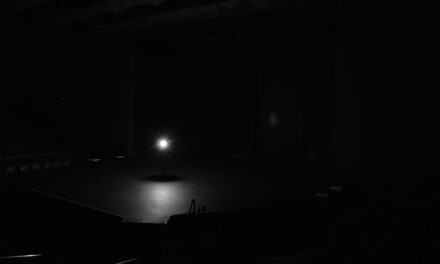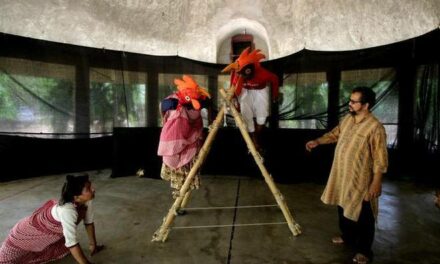On April 1st, 2015, orthodox activists, calling themselves “God’s Will”, performed on the steps of the Moscow Art Theater to protest art that offends religious believers.
It’s not every day that theater directors makes international, above-the-fold headlines — except in Russia. Just recently, the director of the State Academic Theater of Opera and Ballet in Novosibirsk, Boris Mezdrich, was sacked and replaced by the Ministry of Culture after intense pressure from Russian orthodox activists. But on April Fool’s Day a special gift awaited the theater world. A group of activists called “God’s Will,” headed by the notorious Dmitry Enteo, decided to stage their own performance.
The group had been protesting Konstantin Bogomolov’s sensational production of Oscar Wilde’s Ideal Husband at Moscow Art Theater since 2013. Back then they had repeatedly called for the resignation of the theater’s director, Oleg Tabakov, and the immediate closing of the show. One night they even stormed the stage and they called on the spectators to leave.
Now, inspired by the successes of the orthodox activists in Novosibirsk, “God’s Will” redoubled their efforts. Wearing blue and white masks, five activists flanked the steps of the historic Moscow Art Theater as a young woman placed a pig’s head (its forehead inscribed ‘To Tabakov”) at the door. Then a man in a grim reaper costume, scythe and all, walked over and pulled the masks off the faces of the activists – perhaps symbolizing a violent end to theater and theatrics. The activists chanted “Russia without Blasphemy!” and crossed themselves.
Enteo told Radio Svoboda, “If in a month the production [“Ideal Husband”] will still be playing, there will be no Oleg Tabakov, who heads this theater. What happened in Novosibirsk will be nothing compared to the protests that will arise…” Walking away, the activists stomped on their masks.
One young man unrolled a small poster and demonstrated it to the press. Streaked with red to symbolize blood, its unprintable language roughly told all of art to go up the ass. “What sort of art should there be, in your view?” asked a journalist. “Orthodox Christian art,” he responded, “with high ideals – Christian ones, specifically”.
But the turf wars go far back. Almost a decade before Pussy Riot’s “Punk Prayer” at the Cathedral of Christ the Savior, orthodox activists from the “Movement for the Renewal of the Fatherland” stormed into the Sakharov Center for Human Rights (Moscow) and vandalized an ongoing art exhibit called “Caution: religion!” The group got off with citations, after several State Duma deputies intervened on their behalf. The exhibit’s organizers, however, were ordered to pay fines. This year the Sakharov Center faces near-certain closure: it is being investigated as a foreign agent by Russian authorities, even as it continues to hold lectures, and, recently, the staged reading of a play by jailed Ukrainian activist Oleg Sentsov.
“God’s Will” activists protest at the Moscow Art Theater
In general, political theater seems to be diversifying to new platforms. It has become standard practice among Russia’s most prestigious theaters – the Moscow Art Theater, Sovremennik, Lenkom, and others – to seek controversial directors and uncompromisingly political new dramas. On the other hand, political theater makers are simply scrambling for space. Last year alone saw the closing of at least five political theater spaces in Moscow and St. Petersburg, due to systematic defunding, unannounced government inspections, censorship of productions, and even denunciatory letters from anonymous informants. Many of the collectives involved in these theaters reformatted; the embattled Teatr.doc, for instance, seems to be thriving in its new space, and reports an influx of first-time spectators in addition to its loyal audience.
In Novosibirsk, meanwhile, after the scandalous closing of the Tannhäuser production and the firing of longtime director Boris Mezdrich, the staff and performers of the State Academic Theater of Opera and Ballet met their new director, Vladimir Kekhman. Controversial in his own right, Kekhman has headed the Mikhailovsky Theater in St. Petersburg since 2007, after the bankruptcy of his fruit import company. Last year he and another company leader were ordered to pay back 3.1 billion rubles to Sberbank Rossii, the nation’s largest bank, after a two-year trial process found them guilty of stealing bank funds. Authorities are searching several offices of firms belonging to Kekhman.
On March 29 when Kekhman took over the reins from the theater’s longtime director, Boris Mezdrich, Kekhman seemed optimistic: “My main principle,” he told the theater’s staff and performers, “is very simple: the theater must shine. You understand, right? That’s why the main question right now is how we can make it so that, in this wonderful building, we somehow […] give it a sheen. This is what we will undertake.” To Mezdrich, the former director, who was also present at the meeting, he said, “Know this: you will always be my guest.”
Mezdrich addressed the theater where he worked for fourteen years: “Now will be the era of what Vladimir Abramovitch [Kekhman…] calls sheen….The last thing I want to say is, retain your face — your professional and human face,” said Mezdrich to his former coworkers.
The orthodox activists who forced the transition at the Novosibirsk Opera had lobbied for the closing of Timofei Kuliabin’s production of Tannhäuser (Wagner). But they also wanted Kuliabin and Mezdrich to be held responsible for the criminal offense of public actions that insult religious believers — a relatively new statute, passed after the Pussy Riot case in 2013. The Novosibirsk activists were particularly incensed by the Tannhäuser show poster, which depicts Jesus between a nude woman’s legs. They were supported by local and national church leaders. Tannhäuser is now canceled, and Mezdrich replaced, even though the Novosibirsk regional court had ruled in favor of the theater — not the church. Timofei Kuliabin, meanwhile, has been invited to stage a production at the Bolshoi.
Theater-makers and religious activists are rallying their ranks in petitions, blogs, and speeches. Right now the leaders of Russia’s theater establishment emphatically support their fellow establishment theater makers. (That support did not spread quite so generously to Teatr.doc, an independent theater that was unceremoniously booted out of its basement space after twelve legendary years of theater.) In other words, they seem optimistic that the institutions of Russian theater will weather any storm — even the alliance of the most conservative segments of the Orthodox Church with the Ministry of Culture. But what will happen to the complicated balance of power within the state-sponsored theater establishment if tensions increase? Will the theater be able to act?
This post was written by the author in their personal capacity.The opinions expressed in this article are the author’s own and do not reflect the view of The Theatre Times, their staff or collaborators.
This post was written by Ania Aizman.
The views expressed here belong to the author and do not necessarily reflect our views and opinions.


















